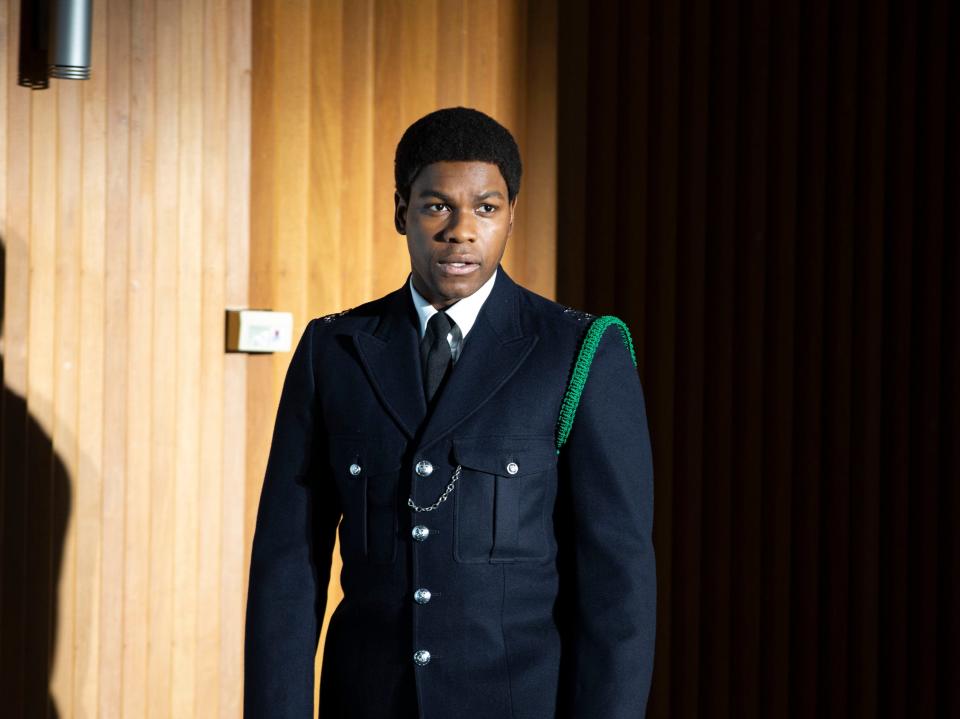Red, White and Blue review: Steve McQueen’s third Small Axe film paints a bleak picture of racism in the UK justice system

If “Mangrove”, the first instalment of Steve McQueen’s Small Axe series, is about being victim to the racist justice system, then “Red, White and Blue” is about being complicit. The film – which is the third episode of the BBC One anthology series on Caribbean Britons in the 1960s-1980s – follows a Black lab technician on a naive journey into the Metropolitan Police.
A word of warning: this film is not an easy ride, particularly if, like me, your views on the police differ to those of protagonist Leroy Logan (John Boyega). Logan, who makes his career change in the early 1980s after his father Kenneth is assaulted by a group of officers, has a firm belief that he can change the institution from within. Following his decision, he navigates the devastating fallout it creates in his family, and the incredibly racist internal politics of the force.
Watching this all play out through the innerworkings of the police feels unnatural – we rarely gain such a stark close-up of what racism looks like on the inside. But Boyega, who cried as he made a speech at a Black Lives Matter protest over the summer, seamlessly slips into Logan’s stoic persona. Both McQueen (who won the Turner Prize for his art in 1999) and cinematographer Shabier Kirchner have a way of plunging you right into his misery through thoughtful and experimental camerawork. When Kenneth is first assaulted, for example, we follow Logan into his hospital room via a roving camera, unable at first to see how battered his father’s face is. And when Logan walks into the station’s changing room, he stares down at his locker, and slowly opens it towards the camera to reveal the words “dirty n*****” scrawled across the door.
The conflict that McQueen circles back to again and again is between Logan’s belief in reform, and the racist realities that confront him in his daily life in the force. “Sometimes I think the Earth needs to be scorched,” Logan confesses to Kenneth over a glass of Wray and Nephew rum. But there is something that keeps bringing Logan back into the station. Perhaps it’s his pursuit of “success”, which he feels a glimmer of as his face is plastered on diversity recruitment ads, or his belief in authority.
It is hard to believe that this film takes place in the same 1980s Britain as Netflix’s grand and glossy fourth season of The Crown – which was released just two weeks ago. Although the Queen’s portrait lurks over the Met’s meeting rooms and lofty halls, Thatcher’s Britain looks very different from the other side; and McQueen draws it up using drab greys, grainy film, brutalist buildings, and melancholy soul music.
And it is ultimately this grim tone that makes “Red, White and Blue” succeed. I’ve been critical of “Copaganda” in the past, but I think this film manages to circumvent the genre – simply because the picture it paints is so bleak. To make matters worse, despite the 40 years between us, Logan’s world really doesn’t feel like a far cry from ours.
So as 2020 winds to a close, and conversations around racist policing roar on in a way McQueen never could have predicted, “Red, White and Blue” serves as a valuable reminder that police racism isn’t just an issue of today – it is an issue of British history.
Read More
A guide to all five episodes of Steve McQueen’s Small Axe series
Mangrove is a triumphant invocation of Black British history

 Yahoo Finance
Yahoo Finance 